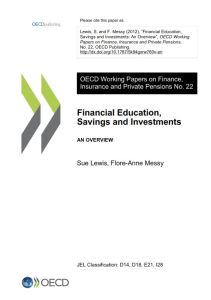Join getAbstract to access the summary!

Join getAbstract to access the summary!
Sue Lewis and Flore-Anne Messy
Financial Education, Savings and Investments
OECD Working Papers on Finance, Insurance and Private Pensions No. 22
OECD, 2012
What's inside?
Why some people save, why some don’t and why that matters.
Recommendation
Consumers all over the world resist saving money. Economists Sue Lewis of the UK Treasury and Flore-Anne Messy of the Organisation for Economic Co-operation and Development, delve into why people won’t save and what governments can do to change this habit. By digging into surveys and literature, the authors learned how the 2008 financial crisis affected consumers, why some people are more motivated to save and why most people aren’t saving enough. The authors examine changes in financial products and show how technology is both an impediment to and an enabler of savings. This paper is accessible enough for anyone who wants to understand the public’s financial behavior – so some conclusions may seem obvious to financial insiders – but nonetheless, it is technically developed and in-depth enough to satisfy the cognoscenti. getAbstract recommends this insightful overview to economists, policymakers and those whose work demands that they be sensitive to consumer behavior.
Summary
About the Authors
Sue Lewis is head of savings and investments in the UK Treasury and Flore-Anne Messy is an administrator in the OECD’s Directorate for Financial and Enterprise.



















Comment on this summary